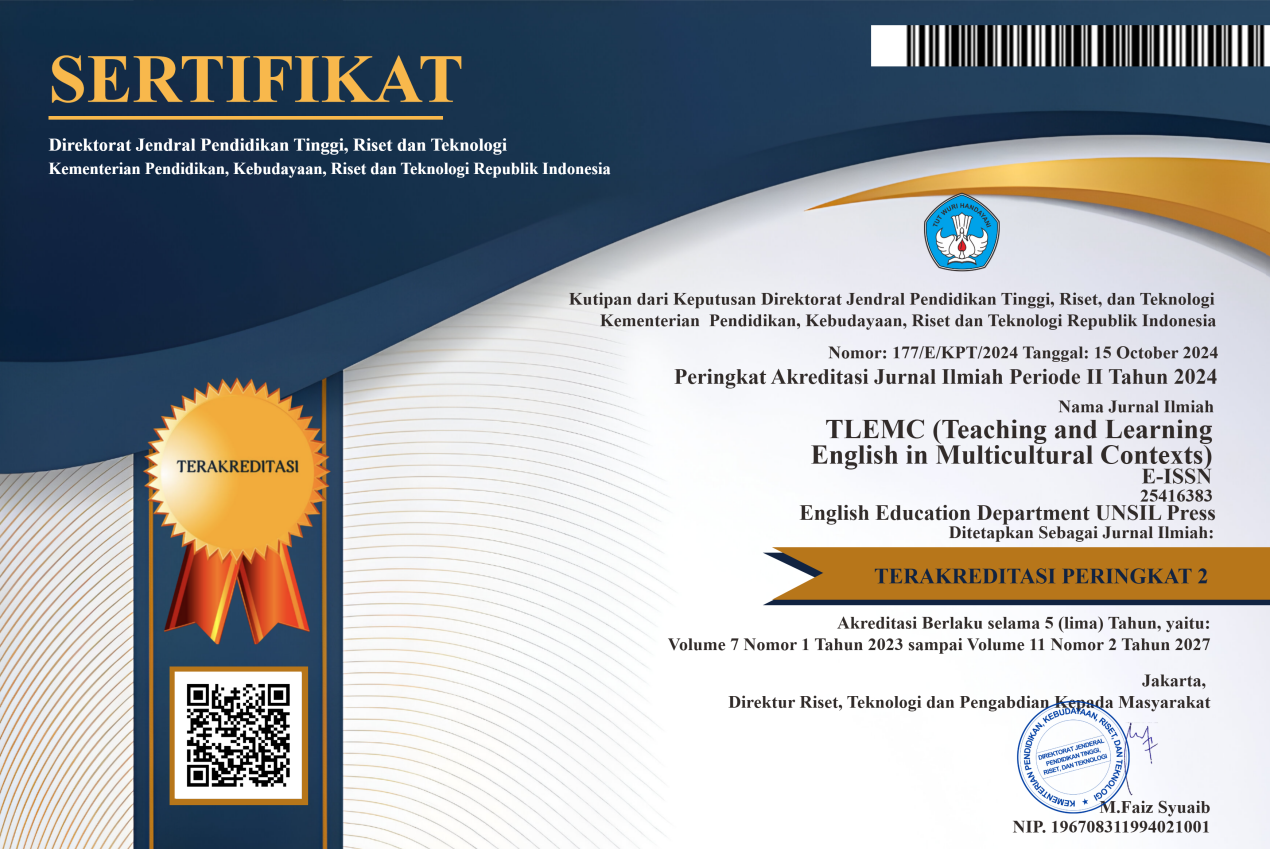Holistic Education in Greta Gerwig’s “Little Womenâ€
Abstract
Holistic education is an approach that appreciates all the aspects of human potencies. As the first teachers of the children, parents are the ideal models who should grow the children holistically. This study aims to discuss the portrayal of holistic education in Little Women, a movie by Greta Gerwig. The main focus of this study is 1) underlining how holistic education became the standard in raising the four daughters in the novel, and 2) the impact of holistic parenting towards their adulthood. To solve the problem, a library study and in-depth analysis are taken and a descriptive-qualitative method is used. The study reveals that 1) within the childhood to adolescence, the parents raise their daughters by fulfilling all aspects of children development – not only their physical but also the four quotients in holistic education: intellectual (IQ), mental or spiritual (SQ), emotional (EQ), and adversity (AQ) and also social ability; thus, 2) the implementation of holistic education gives a very positive impact towards the daughter; makes the daughters capable of facing the demands and challenges of their life especially when they cope problems appears in their career, society and marriage life.
Full Text:
PDFReferences
Ahmar, A. S., Rahman, A., & Mulbar, U. (2018). The Analysis of Students’ Logical Thinking Ability and Adversity Quotient, and it is Reviewed from Cognitive Style. Journal of Physics: Conference Series, 1028(1). https://doi.org/10.1088/1742-6596/1028/1/012167
Efendi, V. A., & Sutanto, E. M. (2013). Pengaruh Faktor-Faktor Kecerdasan Emosional Pemimpin Terhadap Komitmen Organisasional Karyawan Di Universitas Kristen Petra. Agora, 1(1), 2.
Elliott, R., & Timulak, L. (2005). Descriptive and interpretive approaches to qualitative research. 147–160.
Fadhila, S., & Gistituati, N. (2019). The Contribution of Adversity Quotient to Learning Outcomes of Students in Middle School and the Counseling Services Implication. Journal of Educational and Learning Studies, 2(2), 65–70.
Fiah, R. El, Anwar, S., & Wekke, I. S. (2021). Utilizing Model of Spiritual Quotient Developmental Guidance for Indonesian Kindergarten Students. (Icest 2018), 541–549. https://doi.org/10.5220/0010046205410549
Gondal, U. H., & Husain, T. (2013). A Comparative Study of Intelligence Quotient and Emotional Intelligence: Effect on Employees? Performance. Asian Journal of Business Management, 5(1), 153–162. https://doi.org/10.19026/ajbm.5.5824
Hare, J. (2010). Holistic education : An interpretation for teachers in the IB programmes Introduction to IB position papers. International Baccalaureate Organization 3, 1–8.
Irawan, A. R. (2005). Peran Intellegence Quotient (IQ), Emosional Quotient (EQ) dan Spiritual Quotient (SQ) Dalam Peningkatan Mutu Pendidikan. Psikoislamika: Jurnal Psikologi dan Psikologi Islam, 2(2).
Jumala, N. (2017). Memahami Tingkatan Spiritual Manusia Dalam Mendeteksi Krisis Nilai Moral Understanding the Human Spiritual Rank In Detecting Moral Crisis Values. JPPUMA: Jurnal Ilmu Pemerintahan Dan Sosial Politik UMA, 5(1), 42–50.
Kihlstrom, J. F., & Cantor, N. (2019). Social intelligence. The Cambridge Handbook of Intelligence, 756–779. https://doi.org/10.1017/9781108770422.032
Kiral, B. (2020). A Case Study Regarding of the Parental Responsibilities to Their Children. Eurasian Journal of Educational Research, 85, 65–92. https://doi.org/10.14689/ejer.2020.85.4
Labola, Y. A. (2018). Perpaduan Kecerdasan Intelektual (IQ), Emosional (EQ) dan Spiritual (SQ) Kunci Sukses bagi Remaja. Share : Social Work Journal, 8(1), 39. https://doi.org/10.24198/share.v8i1.16168
Little Women. 2019. [film] Directed by G. Gerwig. USA: Columbia Pictures Industries. https://www.sonypictures.com/movies/littlewomen
Mahmood, A., Arshad, M. A., & Ahmed, A. (2018). Spiritual intelligence research within human resource development : a thematic review. Management Research Review, 41(8), 987–1006. https://doi.org/10.1108/MRR-03-2017-0073
Mahmoudi, S., Jafari, E., Nasrabadi, H. A., & Liaghatdar, M. J. (2012). Holistic education: An Approach for 21 Century. International Education Studies, 5(3), 178–186. https://doi.org/10.5539/ies.v5n3p178
Meltzoff, A. N. (1999). Born to learn: What infants learn from watching us. The Role of Early Experiences in Infant Development, 145–164.
Miller, J. P., Karsten, S., Denton, D., Orr, D., & Kates, I. C. (2005). Holistic Learning And Spirituality In Education Breaking New Ground (J. P. Miller, S. Karsten, D. Denton, D. Orr, & I. C. Kates, Eds.). New York: State University of New York Press.
Nur, M., & Saputro, H. (2019). The influence of intellectual quotient (iq) and emotional quotient (eq) on learning achievement of akidah akhlak for tenth grade students at man 1 pasuruan. Universitas Islam Negeri Maulana Malik Ibrahim.
Rianawaty, I., Suyata, Dwiningrum, S. I. A., & Yanto, B. E. (2021). Model of Holistic Education-Based Boarding School: A Case Study at Senior High School. European Journal of Educational Research, 10(2), 567–580. https://doi.org/10.12973/eu-jer.10.2.567
Roberts, C. W. (2015). Content Analysis. International Encyclopedia of the Social & Behavioral Sciences: Second Edition, (2008), 769–773. https://doi.org/10.1016/B978-0-08-097086-8.44010-9
Sanny, L. (2017). the Quality of Early Childhood Education Service in Indonesia. Social Economics and Ecology International Journal (SEEIJ), 1(1), 6–10. https://doi.org/10.31397/seeij.v1i1.4
Saw, G. P. (2013). A frame work Of holistic education. International Journal of Innovative Research & Development, 2(8), 69–74.
Sunarni, D. H., & Rosita, T. (2018). The parent role in early childhood character building (descriptive study at SPS Dahlia Desa Sundawenang Kecamatan Parungkuda Kab. Sukabumi). Jurnal Empowerment, 7(September), 320.
Wat, A. (2015). Transforming the Workforce for Children Birth Through Age 8. Transforming the Workforce for Children Birth Through Age 8. https://doi.org/10.17226/19401
Wawra, D. (2009). Social Intelligence. (October 2014), 37–41. https://doi.org/10.1080/13825570902907193
DOI: https://doi.org/10.37058/tlemc.v6i1.3610
Refbacks
- There are currently no refbacks.
INDEXED BY:
This work is licensed under a Creative Commons Attribution-NonCommercial-ShareAlike 4.0 International License.
![]()
TLEMC (Teaching and Learning English in Multicultural Contexts)
Program Studi Pendidikan Bahasa Inggris
Fakultas Keguruan dan Ilmu Pendidikan
Universitas Siliwangi
Jl. Siliwangi No. 24 Kota Tasikmalaya - 46115
email: tlemc@unsil.ac.id





